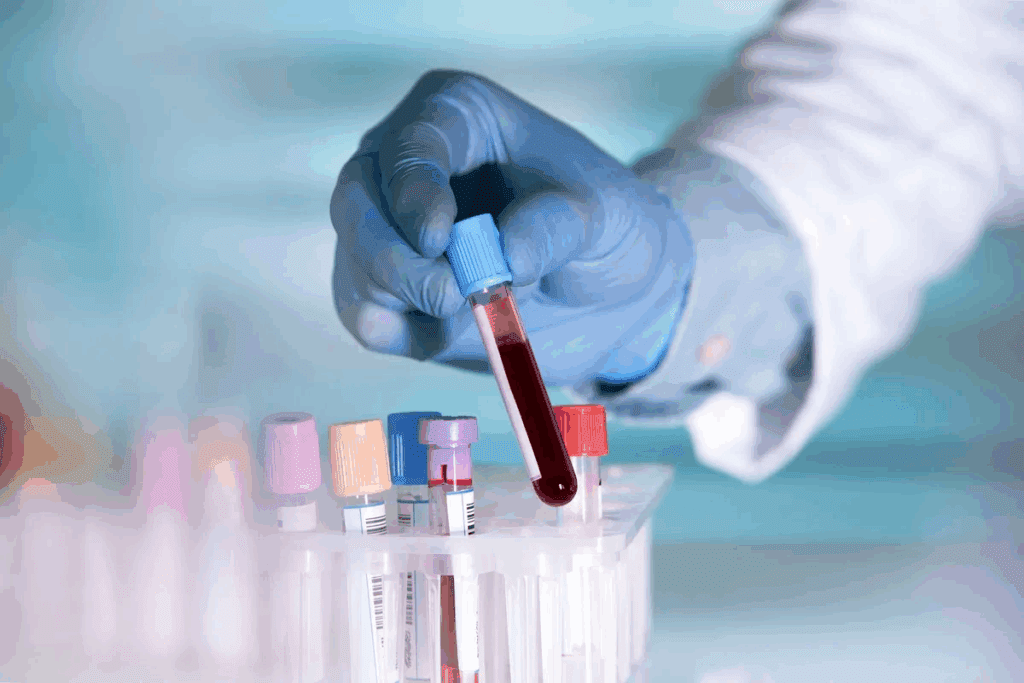
Diagnosing and managing congestive heart failure (CHF) needs a detailed approach. Laboratory tests are key in this process. At Liv Hospital, we focus on evidence-based care and patient-focused diagnostics for the best results.
To accurately diagnose heart failure, healthcare professionals examine patients. They ask about symptoms and medical history. They also use various diagnostic tools, including blood tests. These tests help find underlying conditions that may cause CHF.
Understand important heart failure lab values used to diagnose and monitor CHF.
Knowing the key lab values for heart failure is vital for a good treatment plan. By using the insights from these tests, we offer our patients top-notch care. It’s tailored to their unique needs.

Diagnosing heart failure needs both clinical checks and lab tests. Heart failure means the heart can’t pump enough blood. Accurate diagnosis and management are key to stopping it from getting worse and improving patient health.
Heart failure brings on complex changes like neurohormonal activation and ventricular remodeling. Knowing these changes helps us see how lab tests help diagnose and manage heart failure.
As heart failure gets worse, biomarkers in the blood give us important clues. Lab tests find these biomarkers and show how severe heart failure is.
Labs are key for diagnosing congestive heart failure (CHF) and finding its cause. Tests like natriuretic peptides (BNP and NT-proBNP) are very important. They show cardiac stretch and help spot heart failure.
Other important lab values include blood counts, kidney and liver tests, and tests for electrolytes and thyroid function. These tests give a full picture of the patient’s health and help decide treatment.
Blood tests add to clinical assessments by giving objective data. For example, high BNP or NT-proBNP levels can confirm heart failure. But normal levels might mean something else is causing symptoms.
| Lab Test | Purpose in Heart Failure Diagnosis |
| Natriuretic Peptides (BNP/NT-proBNP) | Diagnose heart failure, assess severity |
| Comprehensive Blood Count (CBC) | Evaluate for anemia, infection |
| Renal Function Tests (Creatinine, BUN) | Assess kidney function, possible kidney disease |
| Liver Enzymes | Check liver function, possible liver congestion |
| Electrolytes | Watch for imbalances that can harm heart function |
| Thyroid Function Tests | Find thyroid disorders that can cause or worsen heart failure |
By combining lab test results with clinical findings, doctors can make better diagnoses. They can then create effective treatment plans for heart failure patients.

Natriuretic peptides are key in diagnosing heart failure. They include Brain Natriuretic Peptide (BNP) and N-terminal pro-BNP (NT-proBNP). These peptides give us important information about the heart’s health. They help us find out who needs more tests and guide treatment plans.
BNP is a hormone made by the heart when it’s under stress. High BNP levels mean heart failure. BNP testing is very useful in emergency situations to tell if breathing problems are heart-related.
Testing for BNP is a simple blood test. It shows if the heart is failing. Normal BNP levels are below 100 pg/mL. But, this can change slightly from lab to lab. If BNP is high, it means the heart failure is more serious.
NT-proBNP is another important peptide for diagnosing heart failure. It’s a part of BNP that gets released into the blood when the heart is strained. NT-proBNP stays in the blood longer than BNP, making it a good marker for heart failure.
Like BNP, NT-proBNP is tested through a blood test. But, its levels are affected by age and kidney function. Higher NT-proBNP levels often mean heart failure is more likely.
Both BNP and NT-proBNP are vital for diagnosing heart failure. They help not just in diagnosing but also in figuring out the risk and checking if treatments are working. Knowing how these peptides work helps doctors give better care to heart failure patients.
Cardiac injury markers are key in checking and treating heart failure. They help spot heart damage and guide treatment for heart failure patients.
Cardiac troponins, like troponin I and troponin T, are very good at showing heart damage. They can show if there’s a heart attack, but also in heart failure. We use them to see how risky heart failure is and what treatment is best.
In cases of suspected heart failure, troponin T is very helpful. High levels mean a patient might need stronger treatment. By checking troponins, we can make sure there’s no heart attack and plan the right treatment.
Creatine kinase-MB (CK-MB) is another marker for heart damage, often used for heart attacks. It’s not as precise as troponins but can be useful in some cases. In heart failure, CK-MB helps with a detailed look at heart injury.
Even though troponins are preferred, CK-MB is useful in certain situations. We look at the whole picture, including other lab results, when we see CK-MB levels in heart failure patients.
For heart failure patients, kidney function tests are key. They help us check for other health issues and see if treatments are working. Kidneys and heart health are closely tied, and kidney problems can affect heart failure care.
Blood Urea Nitrogen (BUN) tests kidney function. It checks the blood for urea, a waste the kidneys remove. High BUN levels mean the kidneys might not be working right, which is common in heart failure.
We watch BUN levels to see if kidney disease is getting worse. This helps us change treatment plans. It’s also a key sign of risk for heart failure complications.
Creatinine is another waste the kidneys filter out. Testing creatinine levels helps us see how well the kidneys are working. The eGFR, or estimated glomerular filtration rate, shows kidney function too. A low eGFR means kidneys are not working well.
For heart failure patients, checking creatinine and eGFR is vital. It helps us catch kidney problems early. This way, we can adjust treatments to protect the kidneys.
Cystatin C is a newer test for kidney function. It’s a protein made by all cells and removed by the kidneys. Cystatin C is less affected by non-kidney factors, making it a better test in some cases.
We use cystatin C to get a clearer picture of kidney health. This is important for heart failure care, where creatinine might not be enough.
Using these tests, we understand the link between heart failure and kidney health better. This helps us give heart failure patients the best care possible.
Managing congestive heart failure (CHF) means keeping an eye on electrolyte levels. These substances are key for nerve and muscle work, keeping us hydrated, and balancing our body’s pH. In CHF, imbalances can hurt the heart and overall health.
Sodium helps control water in our bodies and supports nerve and muscle functions. In CHF, low sodium levels are common. This is often due to too much fluid. It’s vital to watch sodium levels, as low levels can cause serious problems.
Potassium is essential for a steady heartbeat. Low or high potassium levels can be dangerous in CHF patients. Low levels can cause irregular heartbeats, while high levels can stop the heart. It’s important to check potassium levels often, even more so for those on certain medications.
Calcium and magnesium are also important for the heart. Problems with these can affect how well the heart beats and contracts. For example, too little calcium can weaken the heart, while too much can cause irregular heartbeats. Magnesium imbalances can also affect the heart and muscles.
| Electrolyte | Normal Range | Clinical Significance in CHF |
| Sodium | 135-145 mmol/L | Hyponatremia can indicate fluid overload or heart failure severity. |
| Potassium | 3.5-5.0 mmol/L | Hypokalemia or hyperkalemia can lead to arrhythmias. |
| Calcium | 8.5-10.5 mg/dL | Abnormalities can affect cardiac contractility and rhythm. |
| Magnesium | 1.7-2.2 mg/dL | Magnesium imbalance can impact cardiac function and neuromuscular excitability. |
It’s important to test for these electrolytes regularly in CHF patients. This helps doctors make better treatment choices. It can greatly improve how well patients do.
Liver function tests are key in checking for other health issues and seeing how well treatments work for heart failure patients. They help us see how the heart and liver work together, which is important for those with congestive heart failure (CHF).
Patients with heart failure often have liver problems because their heart doesn’t pump well. This can cause liver congestion, leading to abnormal liver function tests. These tests are essential for diagnosing and treating heart failure.
Transaminases, like alanine aminotransferase (ALT) and aspartate aminotransferase (AST), are mainly found in liver cells. High levels of these enzymes can mean liver damage or dysfunction, which might be linked to heart failure. AST is less specific to the liver, but ALT is more so. We check these tests to see if there’s liver injury in heart failure patients.
Bilirubin levels can rise in heart failure patients because of liver congestion, showing a possible worsening of the condition. Albumin, a liver-made protein, can also be affected in heart failure. Low albumin levels might mean malnutrition or liver problems, both of which can affect heart failure care.
Alkaline phosphatase (ALP) and gamma-glutamyl transferase (GGT) are liver enzymes that give us clues about liver health. High ALP and GGT levels can point to cholestasis or other liver issues that can make heart failure worse. We use these tests to fully understand a patient’s liver function and its impact on heart failure.
By adding liver function tests to the diagnosis and treatment plan for heart failure, we can better understand how severe the condition is. These tests, along with other lab values, help us give complete care to heart failure patients.
A Complete Blood Count (CBC) is key when checking for heart failure. It’s a common test that helps doctors see how well a patient is doing. It’s also used to check for other health issues and see if treatments are working.
Hemoglobin and hematocrit are important parts of a CBC. They help find anemia, a big problem for heart failure patients. Anemia can make heart failure symptoms worse. Doctors look for hemoglobin levels below 12 g/dL for women and 13 g/dL for men to spot anemia.
Here’s a summary of how hemoglobin and hematocrit levels can impact heart failure patients:
| Parameter | Normal Range | Implication in Heart Failure |
| Hemoglobin | 13-17 g/dL (men), 12-15 g/dL (women) | Low levels indicate anemia, worsening heart failure symptoms |
| Hematocrit | 40-54% (men), 37-48% (women) | Low levels may indicate anemia or fluid overload |
The white blood cell (WBC) count is also important in a CBC. It shows if there’s an infection or inflammation that could be making heart failure worse. A high WBC count might mean there’s an infection.
RDW shows how different the sizes of red blood cells are. A high RDW can mean iron deficiency anemia or other problems. For heart failure patients, a high RDW is linked to worse outcomes.
The following table illustrates the significance of RDW in heart failure:
| RDW Value | Interpretation | Clinical Implication |
| Normal (11.8-14.5%) | Uniform red blood cell size | Less likely to have severe anemia or nutritional deficiencies |
| Elevated (>14.5%) | Variable red blood cell size | May indicate iron deficiency, vitamin B12 deficiency, or mixed anemia |
In conclusion, the CBC is a key tool in managing heart failure. It helps doctors understand a patient’s health by looking at hemoglobin, hematocrit, WBC count, and RDW. This information helps make better care decisions.
More than just the main lab values, extra tests are key in managing CHF. These tests help us check for other health issues, see how treatments are working, and spot problems early.
Thyroid problems can really affect heart failure care. We suggest thyroid tests for heart failure patients. These tests find hyperthyroidism and hypothyroidism, which can make heart failure symptoms worse or make treatment harder.
Key thyroid function tests include:
Thyroid issues can change heart rate, how well the heart pumps, and blood flow. So, it’s important to find and treat thyroid problems in heart failure patients.
Diabetes is often found in heart failure patients and can affect their health. We use glucose and HbA1c tests to find and keep an eye on diabetes in CHF patients.
These tests provide:
Managing diabetes well is key in heart failure care. Uncontrolled diabetes can make heart failure symptoms and outcomes worse.
“Tight glycemic control in diabetic patients with heart failure can improve outcomes and reduce the risk of complications.”
A lipid profile is important for checking heart disease risk in heart failure patients. This test looks at different types of cholesterol and triglycerides in the blood.
Components of a lipid profile include:
Managing high cholesterol is important in heart failure care. It can affect how heart failure gets worse and the risk of other heart problems.
Iron deficiency is common in heart failure patients and can make symptoms and exercise harder. We use iron studies to find iron deficiency and help with treatment.
Key iron studies include:
Iron replacement can help symptoms and quality of life in iron-deficient heart failure patients, even if they’re not anemic.
By adding these extra lab values to our heart failure assessment, we can give better and more tailored care to CHF patients.
Understanding heart failure lab values is key to managing the condition well. Lab tests help us assess risk, diagnose, predict outcomes, and monitor heart failure. As healthcare providers, we must link lab results with clinical findings for complete patient care.
When looking at heart failure lab values, we must consider the patient’s symptoms, medical history, and other test results. For example, high natriuretic peptides (BNP or NT-proBNP) can signal heart failure. But, levels can also be affected by age, kidney function, and obesity. By combining lab results with clinical data, we can make more precise diagnoses and tailor treatments.
Key considerations when integrating lab results with clinical findings include:
Regular lab tests are essential for tracking heart failure progression and treatment success. By monitoring lab value changes over time, we can spot issues early and adjust treatments as needed.
| Lab Test | Baseline Value | Follow-up Value | Interpretation |
| BNP (pg/mL) | 500 | 200 | Decrease indicates improved heart failure status |
| NT-proBNP (pg/mL) | 2000 | 1000 | Decrease suggests reduced ventricular wall stress |
| Creatinine (mg/dL) | 1.2 | 1.5 | Increase may indicate worsening renal function |
Lab values are critical in making treatment choices for heart failure patients. For instance, high cardiac troponins may show myocardial injury, requiring more aggressive treatment. On the other hand, improving lab values can help adjust medications or therapies.
Key lab values that guide treatment decisions include:
Lab tests are vital in managing heart failure, but there are challenges. These include variability in test results, possible drug interference, and the importance of considering the clinical context. By knowing these challenges and carefully linking lab results with clinical findings, we can offer better care for our heart failure patients.
Understanding these challenges and integrating lab results with clinical findings helps us provide more effective care for our heart failure patients.
Laboratory testing is key in managing heart failure. It helps doctors diagnose, monitor, and treat this complex condition. Studies show that using heart failure lab tests improves how we assess risk and make treatment plans.
Looking ahead, lab tests heart failure will keep being essential in diagnosing and managing CHF. New biomarkers and advanced tests will help us give more personalized care. This way, doctors can tailor treatments and better outcomes for patients.
We aim to lead in laboratory testing to offer top-notch healthcare. This ensures patients get the best care for heart failure, improving their life quality.
Laboratory testing is key in diagnosing congestive heart failure. It gives important info about the heart and other organs. Blood tests help doctors understand how severe heart failure is and plan the best treatment.
Natriuretic peptides, like BNP and NT-proBNP, are top choices for diagnosing heart failure. They are heart proteins made when the heart is under strain. Doctors use them to see how bad heart failure is.
Cardiac injury markers, such as troponins and CK-MB, help spot and manage heart failure. They show if the heart muscle is damaged.
Kidney function tests, like BUN and creatinine, are vital for heart failure patients. They help check kidney health and adjust treatment plans.
Electrolyte imbalances, like sodium and potassium, are big in CHF management. Keeping an eye on these levels is key to avoiding problems and treating well.
Liver function tests, such as transaminases, help doctors understand liver health and its link to heart failure.
A CBC gives important info on the patient’s health, like hemoglobin and white blood cell count. It’s key for managing CHF.
More lab values, like thyroid tests and lipid profiles, are important for a full heart failure check-up and effective care.
Lab values are looked at with clinical findings to guide treatment. They help track disease progress and adjust care plans.
Blood tests are key in diagnosing heart failure, but not the only tool. A full diagnosis combines lab results with clinical findings and other tests.
Serial testing is vital in managing heart failure. It lets doctors track disease, adjust treatment, and make informed care decisions.
Lab values are critical in making treatment choices. They help adjust medications, lifestyle changes, and other interventions to improve patient outcomes.
National Center for Biotechnology Information. (2025). 12 Key Heart Failure Lab Values Essential Blood. Retrieved from https://www.ncbi.nlm.nih.gov/pmc/articles/PMC2582112/
Subscribe to our e-newsletter to stay informed about the latest innovations in the world of health and exclusive offers!
WhatsApp us